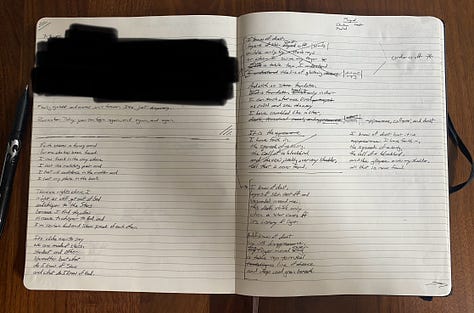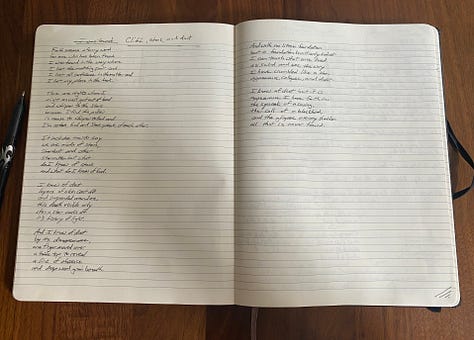Cliché, stars, and dust: A reflection
Certainty and faith

Themes
Our lives contain many small stories embedded in a larger personal story which is just one cell of an ultimate story. This poem tells a small story about the transformation of my childhood beliefs within the context of a large story. Perhaps in some way, your story overlaps. It is a story of change, a story of expansion, and a story of acceptance.
Faith and certainty were close cousins in the spiritual context I was raised in, a strange pairing for words that in many ways are not synonymous with each other. The logic went something like this. There are things we cannot make sense of and there are unsettling questions we inevitably wrestle with. We transfer the uncertainty to the idea of god, and rest faith there. That faith means we become certain of answers to the unsettling, ultimate questions that haunt us such as our standing in the ultimate story, how we came to be, what our purpose is, and what happens when this life ends. Conscience soothed.
There was acknowledgment of mystery, but with mystery shackled to an object, faith was only needed for that object and often that faith resulted in brash confidence of who god is. There was little to no room for further questions, and to explore the layers found in topics where certainty existed in the institution’s mind was seen as dangerous and a threat. As adult life went on, I found myself dissatisfied with the answers I had come to accept as they disregarded an honest assessment of my life and the broader life that I found myself living in.
This pattern develops in many circles, not just religious. Humans are not exactly known for tolerance of the other as some semblance of order seems necessary to survive. To face one who sees the world differently or asks questions about ideas that another sees as settled seems to be inviting a level of disorder or even working towards your system’s demise. This can cause some gnarly existential fear. Of course we grasp what we need to soothe ourselves.
As I have unraveled from this knot of certain faith, it seems clear that any new layer of certainty simply asks more questions. It is here where faith and certainty are cousins. Not that faith equals certainty, but that certainty creates a need for faith. As science answers questions of how things are, science also states we will never understand how things are. As children become adults, the idea of peace upon arrival at some threshold disappears as we learn that each threshold is simply an open door to an even greater landscape. Each discovery requires an extra measure of faith as each discovery asks questions that erode the firm foundation we previously assumed we stood on.
Cliché, stars, and dust is an exploration of the erosion of a faith that was certain and the building of certainty that demands an ever-growing measure of faith.



The poem
Remember, any explanation of a poem is rubbish if you experience something different, even if the explanation is the authors. Poems speak to each of us in unique ways because they contain life that interacts with our own lives. Here is a brief breakdown of what this poem says to me. Maybe this will open new paths of understanding, but that does not make your current understanding “incorrect”.
Faith seems a funny word
for one who has been found.
I was found in the way where
I lost the matching pair and
I lost all confidence in the matter and
I lost my place in the book.
The first stanza is a play on various clichés we associate a finding or losing with. It claims that the notion of being found is uncovered in being lost, and not only being lost, but losing what was had at a prior time. I had the matching pair in hand and lost it. I had confidence, and it disappeared. My name was assigned to the heaven column in an existential book, but that place has certainly been erased.
There are nights where I
might as well get out of bed
and whisper to the Stars
because I find the pillow is cause
to whisper to God and I’m certain
God and Stars speak of each other.
Stanza two describes the struggle surrounding losing certainty. I remember many nights praying to god while lying in bed and finding such relief in that conversation. No matter how much I might want that relief, I can’t find it by walking through the motions of a practice that I do not have faith in. I still search for it through other practices and am learning to tie parallels between my prior way and my current way, finding a new place for faith to live.
It is cliché now to say
we are made of stars,
stardust and other
star matter but what
do I know of Stars
and what do I know of God.
Stanza three cuts to the heart of what a new certainty delivers. With every new realization, one is served best by facing new certainty with humility, understanding that the number of questions will continue to multiply and the size of the questions will continue to grow.
This stanza also contains what I refer to as a “question statement”, a question without the punctuation of the question mark. There is an acceptance in this format, that even though the question exists, it is a question that will have to live settled inside, likely with no firm answer. Faith.
I know of dust,
layers of skin cast off
and suspended around me,
this death visible only
when a star casts off
its history of light.
And I know of dust
by its disappearance,
one finger moved over
a tabletop to reveal
a line of absence
and deep wood grain beneath.
Stanzas four and five use the image and movement of dust to meld the existential and the everyday. The brevity and close placement of the existential and everyday words brings a knowing that even in something so trivial, there is mystery that continues to grow.
And with no stone foundation
but a foundation built only in dust
I can touch what once lived
as solid and see the way
I have crumbled like a star,
appearance, collapse, and dust.
Stanza six is an exploration of our place in the story. It is an exploration of what remains of an old faith, then makes a case for a soothed conscience as we know that who we are will play out the way everything that came before us did. All will change, all will die, but in some mysterious way we will always continue.
I know of dust but it is
appearance I have faith in,
the squeak of a swing,
the call of a blackbird,
and the glimpse over my shoulder,
all that is never found.
The final stanza declares a new faith. It is faith in a continual appearance that is beyond what can be seen and beyond what can be understood. It is faith in an ultimate presence that every creature, every place, every thing, and every time is part of.
A note on editing and closing
This is the first poem I have changed after another read it (I suppose that’s called having an editor). I shared a draft with my wife, a woman with a keen eye for emotion, fierce honesty, and unconditional love. She challenged a few lines and stanzas in this piece, and out of her challenge this poem rose to a different elevation.
I want to acknowledge that when faith, religion, and belief are melded, they are often used to oppress. That is a topic for another poem to explore deeply, but in short, if one finds their faith shrinking the number of ways there are to be in this world, it is a different path than I am on and not the faith I write about in this piece. Each occurrence opens the possibility of an infinite number of other occurrences. What was only leads to what will be. There is no returning to a prior time. When we find ourselves shrinking in on ourselves and those who are just like us, it comes from our inability to sit with the questions that continually appear before us. It comes from a lack of faith.
May you find your foundation in every unanswered question…
Brian
If you missed the original “A Poem” post of Cliché, stars, and dust, I hope you will read and enjoy! You can find it here.


Wonderful poem and post Brian. Listening to some else's opinion of our work can be eye-opening and very helpful. Especially when it is someone we trust.
Brian, I hear this poem quietly noticing the tender human need for safety, for certainty. We're all born with this craving. But as we begin to question the status quo, we see how this reflexive need can limit our *deep enjoyment* of the Mystery, Love and Infinity of God. For me, it's been a humble awakening.
The more we learn, the more one sees the vast plain of Mystery opening ever-wider.
Sometimes we see this in learning other things: like how to parent our children, or how to be a true friend to our partners, how to practice our profession, to make our art--or how to let ourselves be unconditionally loved.
The question statement is an excellent concept!
To *not* know, but to rest in the unknowing.
That's the beauty of the practice. That's poetry.